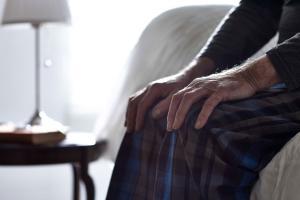In the early stages of knee pain and stiffness, treatment can be done with medications and exercise

With advancing age, the incidence of health problems also increases. In our country, aside vision-related conditions, diabetes, and hypertension, degenerative joint conditions are commonly observed in the elderly population. Community-based studies have reported approximately 44% prevalence of arthritis in the elderly population, with pain, stiffness and inability to walk comfortably being the chief symptoms. The reason behind this is that, with age, having accumulated stress-related factors throughout the life of the individual, repair mechanisms of the body slowly start declining. Moreover, old age is also associated with wear and tear of structures in our body, thereby resulting in degenerative arthritic conditions.
ADVERTISEMENT
The knee joint is commonly involved in Osteoarthritis (OA) and is caused due to cartilage degradation. The knee is a weight-bearing joint and has an important role in horizontal (walking, running) and vertical (jumping) movements. As age advances, there are changes in muscle mass surrounding the joint structure as well as cell and matrix-related changes inside the joint tissue which lead to degeneration. Also, loss of normal bone structure with age and other co-existing factors such as obesity, traumatic injuries etc. all contribute to OA of the knee.
In the early stages of knee pain and stiffness, treatment can be done with medications and exercise. However, for those who have not obtained relief from non-surgical treatments, joint replacement surgery must be considered. Most elders avoid discussing about joint replacement surgery due to fear of dependent living and doubtful treatment outcomes. Most doubts
regarding surgery are due to misleading information. Explain to them that, with technological and material related advances, tremendous improvement has been observed in knee joint replacement techniques. Approximately 85% procedural success rates have been reported and results last for up to 20 years following replacement. Total knee replacements are considered amongst the safest, effective procedures in medicine. With the rise in awareness programs, our country has seen an annual increase in the total number of knee replacement surgeries from 5000 to 65,000 (based on a 2013 report). Dr Mudit Khanna, Orthopedic surgeon, Wockhardt Hospital Mumbai Central lists out do's and dont's after knee replacement surgery.
Do's and Don'ts after Knee Replacement Surgery
- Diabetes, hypertension, infectious diseases, immune-compromised status etc. may be prevalent in the elderly: Keep these under optimal control as they may interfere with healing.
- Maintain a hygienic environment and a wholesome diet to minimise chances of infections and help boost immunity.
- Give the body time to get used to the artificial prostheses: Do not immediately start with prolonged walking, sitting cross-legged etc. Follow the rehabilitation protocol as advised by your physiotherapist.
- Ensure maintenance of optimum body weight: Do not over-stress the artificial joint! By ensuring the maintenance of overall health status and a disciplined lifestyle, results of knee replacement (with respect to pain and ease of movements and daily activities) can be maintained for long periods of time.
Catch up on all the latest Crime, National, International and Hatke news here. Also download the new mid-day Android and iOS apps to get latest updates
 Subscribe today by clicking the link and stay updated with the latest news!" Click here!
Subscribe today by clicking the link and stay updated with the latest news!" Click here!







